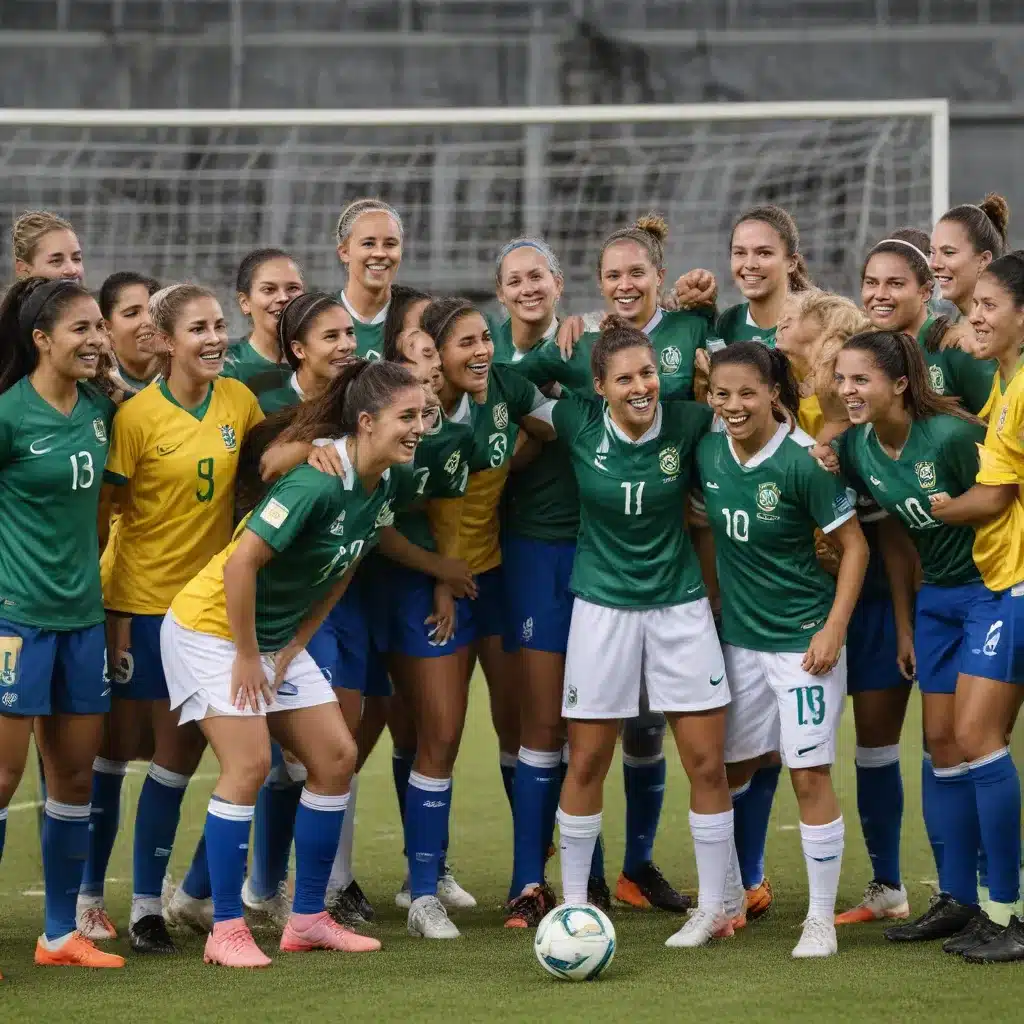
Football Culture in Brazil
Football is the lifeblood of Brazil, woven into the very fabric of the nation’s culture and identity. From the samba-infused stadiums to the passionate torcida (fans), the game commands an almost religious devotion. However, this deep-rooted love for the sport has traditionally been a male-dominated realm, with women often relegated to the sidelines as spectators rather than participants.
The prevailing machismo in Brazilian football has created significant challenges for the growth and development of the women’s game. Underfunding, lack of media coverage, and persistent gender stereotypes have long hindered the progress of female footballers in a country where the jogo bonito (the beautiful game) is synonymous with masculinity.
Mentorship Programs: Empowering the Next Generation
Yet, a new wave of change is sweeping through the Brazilian football landscape, fueled by the tireless efforts of pioneering women who are determined to shatter these glass ceilings. At the forefront of this movement are innovative mentorship programs that are empowering young female players to reach their full potential.
These initiatives are not just about honing technical skills on the pitch; they’re about instilling confidence, leadership, and a sense of purpose in the next generation of Brazilian footballers. By pairing aspiring players with experienced mentors, these programs are nurturing the holistic development of their mentees, equipping them with the tools to navigate the challenges of a male-dominated industry.
Claudia Villarinho Ramos: Blazing the Trail
One such trailblazer is Claudia Villarinho Ramos, a former Brazilian international and the founder of the “Futebol Feminino” mentorship program. Recognizing the lack of role models and support systems for young female players, Ramos established her initiative to provide a comprehensive ecosystem of guidance, training, and empowerment.
“It’s not just about the technical aspects of the game,” Ramos explains. “We want to instill in these young women a sense of self-worth, resilience, and the belief that they can succeed in this sport, regardless of the obstacles they may face.”
Through her program, Ramos and her team of experienced coaches and mentors work closely with aspiring players, helping them develop not only their football skills but also their leadership qualities, communication abilities, and strategic thinking. The mentors serve as both role models and confidants, offering invaluable insights and support throughout the players’ journeys.
Empowering Young Players: The Transformative Impact
The impact of these mentorship programs is undeniable. Participants often report a profound shift in their self-confidence, decision-making abilities, and overall perspective on their potential in the sport.
“Before joining the program, I never really saw myself as a leader,” says 17-year-old Mariana, a rising star in the program. “But with the guidance and encouragement of my mentor, I’ve learned to step up, to speak up, and to believe in my abilities on and off the pitch. It’s been a life-changing experience.”
Such transformations are not limited to the individual level; they ripple through the broader football community, inspiring a new generation of female role models and shattering long-held gender stereotypes.
The Future of Brazilian Women’s Football
As these mentorship initiatives continue to flourish, the future of Brazilian women’s football looks brighter than ever. Grassroots efforts to increase participation, coupled with growing support from football federations and the media, are paving the way for a more inclusive and equitable landscape.
“We’re not just developing better players; we’re cultivating the next generation of leaders, advocates, and trailblazers,” says Ramos. “By empowering these young women, we’re not only transforming the face of Brazilian football but also creating a more just and inclusive society.”
The journey ahead may still be challenging, but with the dedication and vision of mentors like Claudia Villarinho Ramos, the dreams of young female footballers in Brazil are closer to reality than ever before. As the nation’s football culture continues to evolve, the impact of these mentorship programs will be felt for generations to come, paving the way for a future where the beautiful game truly belongs to everyone.
The Role of Brazilian Football Federations
While grassroots initiatives have been instrumental in driving progress, the support and involvement of Brazil’s football governing bodies have also been crucial in shaping the future of the women’s game. The Brazilian Football Confederation (CBF) and state-level federations have begun to prioritize gender equality and invest in the development of women’s football.
In recent years, the CBF has implemented several programs aimed at increasing participation, improving infrastructure, and providing better resources for female players. This includes the establishment of a professional women’s league, the Campeonato Brasileiro de Futebol Feminino, which has helped to raise the profile of the sport and create more opportunities for players.
Additionally, the federations have worked to promote positive role models and challenge traditional gender norms. By showcasing the achievements of female footballers and coaches, they are inspiring a new generation to pursue their dreams in the sport.
“The support from the federations has been a game-changer,” says Ramos. “It’s not just about the financial resources; it’s about the recognition and validation that the women’s game deserves. This sends a powerful message to young girls that their aspirations are valid and that they can thrive in this industry.”
As the Brazilian football ecosystem continues to evolve, the collaboration between grassroots initiatives and the governing bodies will be crucial in sustaining the momentum and ensuring that the progress made in women’s football is truly transformative and long-lasting.

